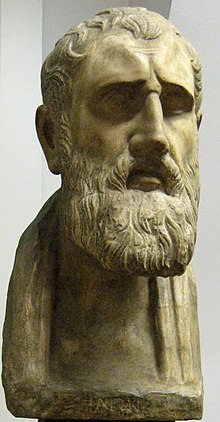
\ˈstō-ik\
Definition:
one apparently or professedly indifferent to pleasure or pain
Etymology:
Middle English, from Latin stoicus, from Greek stōïkos, literally, of the portico, from Stoa (Poikilē) the Painted Portico, portico at Athens where Zeno taught
First Known Use: 14th century
This is an interesting word. I would say that Data from Star Trek: The Next Generation was stoic, but that would be incorrect because he didn't possess emotions. Stoics instead thought that emotions clouded judgment, hindered good decision-making and led to bad behavior. As a matter of fact, they thought the measure of a man was not in what he said but rather how he acted.
The term stoic is often misused today to indicate an absence of emotion, as in my example above, but that is not what the early Stoics meant at all. They meant to experience emotions, but to control them; following instead a path of reason, thinking, and logic. Stoics channeled their emotions to produce wisdom and inner peace, as opposed to acting based on feeling. Sounds like a pretty good idea to me.



